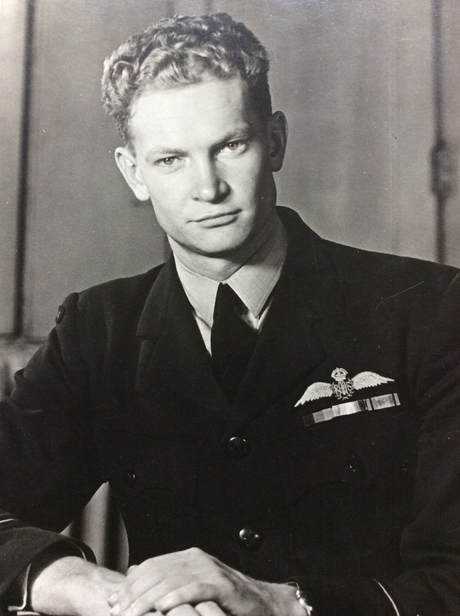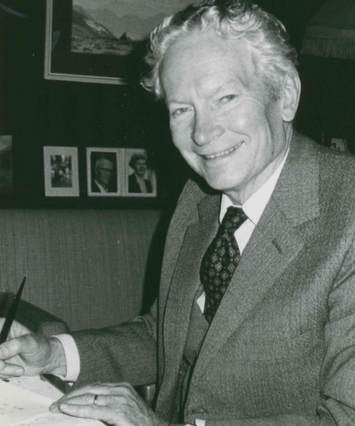Born in 1923 in North Queensland, Gordon's early childhood was spent on his grandfather's pineapple plantation or, after the family moved to north Western Australia, making friends with the Chinese pearl shellers on the jetty at Broome. His father, Frank Wise, was elected to Parliament in 1933, unusually on a Labor ticket from a conservative rural electorate, in recognition of his work to establish the region’s tropical agriculture industry. When he became Minister for Agriculture, the first of his portfolios, the family moved to Perth.
Gordon entered Modern School on a scholarship, where as well as an active social life, hockey, football and swimming were among his interests - a Surf Lifesaving Instructor's Certificate being one of his proudest possessions. In his last year at school he followed a girlfriend to an Oxford Group (or Moral Re-Armament) ‘house party’ for young people where a spiritual intervention occurred, a unique stirring that challenged all his thinking and habits. He was known as being out to enjoy life, taking risks, getting into trouble and wearing stylish clothes. Such was the atmosphere, the faith and sincerity of the cleric in charge that Gordon was on his knees at the end of the week giving all he knew of himself to all he knew of God. This started him on a lifelong friendship with a former rival in the same class at school, Jim Coulter. He said as the week progressed, ‘If I can tolerate Coulter, there must be something in this MRA.’ The feeling was mutual. In accordance with the group’s suggestion, they started on a path of listening to their ‘inner voice’ daily, to seek God’s leadership in their lives.
After leaving school following the outbreak of World War II, Gordon volunteered for the armed forces, but too young for call-up, he began what looked like being his career by working in the State Treasury Office. Both he and Jim had undertaken a traineeship at the West Australian newspaper as cub reporters, but it was Jim who was offered the job available. Surprisingly, the two were called up for service at the same time, trained as Royal Australian Air Force pilots together and were assigned to the same squadron which brought them to the UK. As pilots of Sunderland Flying Boats they patrolled the seas around the European coasts and halfway across the Atlantic, nerve-wracking night flying not far above sea level, to protect Allied shipping from Nazi Germany's submarine attacks, including during D-Day operations. They were supported by the Oxford Group network of friends working across Britain in these years, and participated in its programmes when on leave.
At the end of the European war, instead of waiting for a troopship to take them home via the Suez Canal, they agitated for permission to return to Australia via the USA, where conferences at Mackinac Island in Michigan were developing training in a programme of Moral Re Armament. There, they were invited to join an international team to take a message of personal change and of bridge-building following the devastating effects of war. On the train crossing Australia on the last lap of his repatriation across the world, another spiritual experience confirmed a calling to make this work of building the peace his life’s goal. His father, by then Premier of the State, was not at all pleased at this, as it meant turning down his Treasury job, but he came to acknowledge Gordon’s ambition to contribute to postwar reconciliation, after he himself had seen its effect in Europe when making a parliamentary visit. He even invited his son to speak in the West Australian Parliament about the work he was engaged in.
Gordon’s time alongside two of MRA’s great early activists, Bill Jaeger and Irene Laure, among groups that included both the coal miners and mine owners of the German Ruhr, or in the steel industry of Northern France, built a conviction in him to work to bridge conflicts in world labour. He went on to be a key player in teams visiting to inspire like-minded people, and often staying on to support them, in countries that included Japan, the Philippines, Indonesia, India, Burma, Vietnam, Laos, Thailand and Cambodia.
Industry in Britain had many crises in the 1960s and Gordon’s MRA work included similar activities befriending miners and steelworkers on Tyneside; shipyard workers on the Clyde, and in Belfast and Aberdeen; and dockers and stevedores on the London, Liverpool and Bristol docks. The goal was to support those who led the divided unions and unofficial unions, and similarly those in management and government, to try to get to the heart of the trouble in hand, and to offer a listening ear to all sides in the pursuit of understanding and trust.
Gordon became Secretary to the Oxford Group, the registered name of the formal charity supporting MRA work, in 1972. This role meant more responsibility, more administration, and less flexibility to spend time visiting people in their own fields. Having previously been based at Tirley Garth in Cheshire, the British regional conference centre which was an ideal setting for industrial gatherings and which he loved, he moved to London with his wife and young son. He and Marjory, who he had married in 1966, consecutively hosted three homes there, with core households of up to 14 people, which formed part of MRA’s London headquarters along with the Westminster Theatre. These provided the opportunity both to train others in outreach work, and to create an off the record venue for people to meet, often at ‘working dinners.’ Those invited might be labour shop stewards, ambassadors, representatives from various faiths, politicians, educators or writers in the national press. Friendships emanating from those occasions generated a number of mutual support networks and opportunities for dialogue in years to come. Younger people who worked alongside him often talked of how they felt included, and encouraged in their search for what should be their own life's work. Gordon had the gift of making friends and being faithful to them.
After Watergate and the end of the Vietnam War, both Gordon and Marjory felt a conviction that with the world expecting so much from America, who could support their like minded friends and colleagues in USA? They offered to help in any way and were immediately welcomed by those who had relaunched MRA’s work there after a change in direction from the one it had had in its earlier years. This led to numerous visits especially as Gordon became a member of the US Board of Directors. A friendship begun with the Cardinal Archbishop of Vienna ten years earlier, through Swiss friends, in the course of MRA’s conferences at Caux-sur-Montreux, led to the Wises inviting Cardinal Koenig to take part in the 50th Anniversary of MRA in London. Koenig had shown wholehearted support for its work over the years, describing it as ‘an apostolate of the laity’. A speaking tour to Washington DC, Boston and New York followed, accompanied by the Wises.
After he turned 70, Gordon and Marjory moved away from the pace of London life and as much international travel, but current affairs and care for people who bore great responsibility continued to dominate Gordon's active mind and spirit. In 2002 he had a significant stroke, but after six months of hospital rehabilitation he was able to return home to a completely different lifestyle. But he would not allow physical disability to stop his adventures or engagement in political matters, even grilling those involved in issues of the day. In the last 18 years of his life, even more friendships were forged, and many old ones continued.
Gordon was no saint, but a visionary. He took risks which usually had positive results but he also knew confrontation and had to work towards unity. He would remind himself of St Paul's words to the Philippians, "Always consider the other the better man". Forgiving and being forgiven always brought a fresh start. On October 4, 2020 he passed away peacefully at home knowing that his time to go to his eternal rest had come and he looked forward to it.
By his wife Marjory and son Gordon Wise
English


